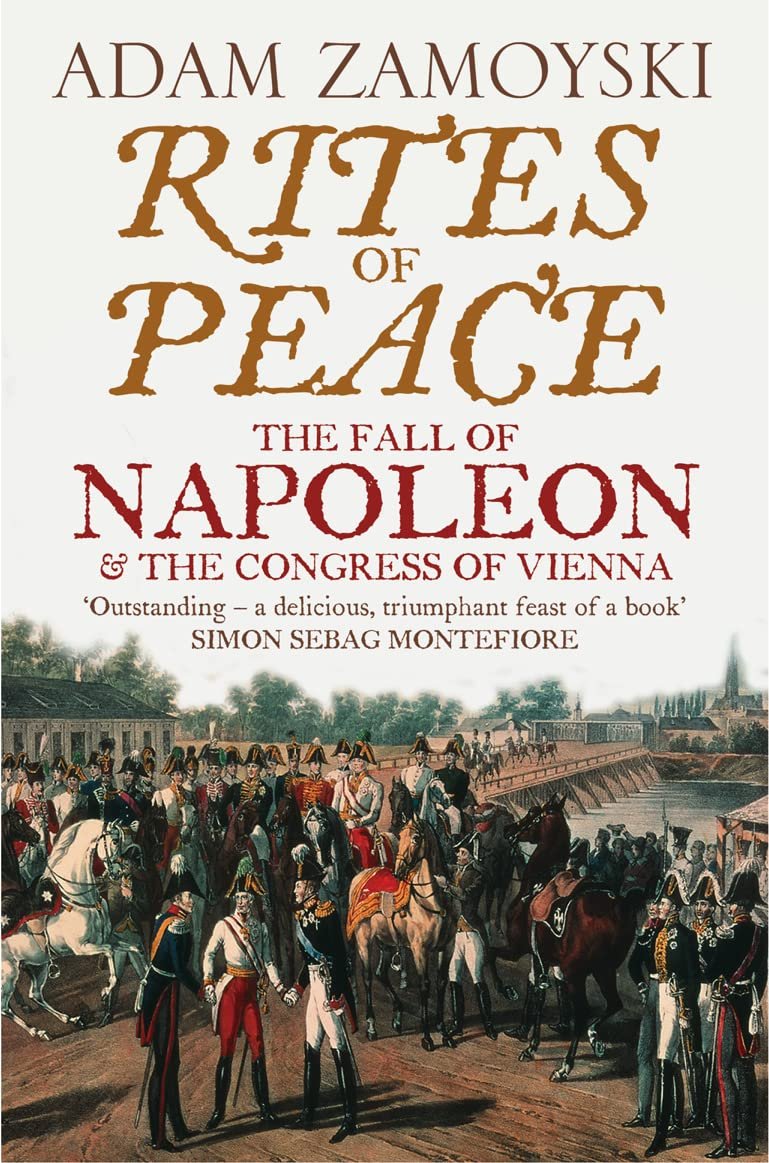RITES OF PEACE: The Fall of Napoleon and the Congress of Vienna
In the wake of his disastrous Russian campaign of 1812, Napoleon’s imperious grip on Europe began to weaken, raising the question of how the Continent was to be reconstructed after his defeat.
There were many who dreamed of a peace to end all wars, in which the interests of peoples as well as those of rulers would be taken into account. But what followed was an unseemly and at times brutal scramble for territory by the most powerful states, in which countries were traded as if they had been private estates and their inhabitants counted like cattle. The result, fixed at the Congress of Vienna in 1815, not only laid the foundations of the European world we know. It put in place a social order and a security system that remained in place until 1914. When that system fell apart, the tensions it had contained came to the fore with disastrous results, in the shape of rabid nationalism and militant socialism. The events described in this book therefore lie at the root of many of the problems that still dog the world today.
Although the defining moments took place in Vienna, and the principal players included Tsar Alexander I of Russia, the Austrian Chancellor Metternich, the British Foreign Secretary Lord Castlereagh, the Duke of Wellington and the French master of diplomacy Talleyrand as well as Napoleon himself, the accepted view of a gathering of consummate statesmen reordering the Continent in elegant salons is a false one. Many of the crucial questions were decided on the battlefield or in squalid roadside cottages amid the vagaries of war. And the proceedings in Vienna itself were not as decorous as is usually represented.
Drawing on a wide range of first-hand sources in six languages, which include not only official documents, private letters, diaries and first-hand accounts, but also the reports of police spies and informers, Adam Zamoyski gets below the thin veneer of courtliness and reveals that the new Europe was forged by men in thrall to fear, greed and lust, in an atmosphere of moral depravity in which sexual favours were traded as readily as provinces and the ‘souls’ who inhabited them. A chilling account, full of menace as well as frivolity.
Extracts from reviews of RITES OF PEACE
‘Deeply researched, elegantly written, gleaming with the political and sexual depravity of the Congress that decided the fate of Europe, Zamoyski’s Rites of Peace is outstanding - a delicious, triumphant feast of a book.’
Simon Sebag Montefiore, Daily Mail
‘Zamoyski’s account of the labyrinthine twists of diplomacy is both masterly and exhaustive… I closed this book full of admiration for its author.’
Max Hastings, Sunday Times
‘An exhilarating book … not since Margaret MacMillan’s instant classic on the Treaty of Versailles has there been a book on diplomacy of such richness and readability. Zamoyski advances his case with a story-telling detail that makes his book hard to put down [and] has achieved a rare feat. He has taken the driest of diplomatic archives and turned them into a compelling narrative.’
Denis MacShane, Guardian
‘Magnificent… both an intellectual and a literary joy to read… the work of an accomplished raconteur and a formidable scholar. I doubt there will be many more important or rewarding books than this published this year.’
Alan Mallinson, Times
‘Zamoyski writes elegantly and vividly, and deftly balances the complex details of the negotiations with colourful portraits… [his] achievement is to have brought to life one of the great turning-points in European history.’
Munro Price, Sunday Telegraph
‘Zamoyski has covered this maddeningly complicated period with scholarship, comprehension and detachment… [he] has given us an intimate understanding of this most complex of times.’
Lucy Moore, Daily Telegraph
‘In this sophisticated, panoramic account of Europe’s transition from war to peace in 1815… Zamoyski succeeds brilliantly, balancing the many strands of his narrative with intelligence and grace. Lucid overviews of high politics … are interspersed with vivid set-pieces, telling anecdotes and poignant individual portraits. Rites of Peace is a fine example of narrative history.’
Christopher Clark, Literary Review
